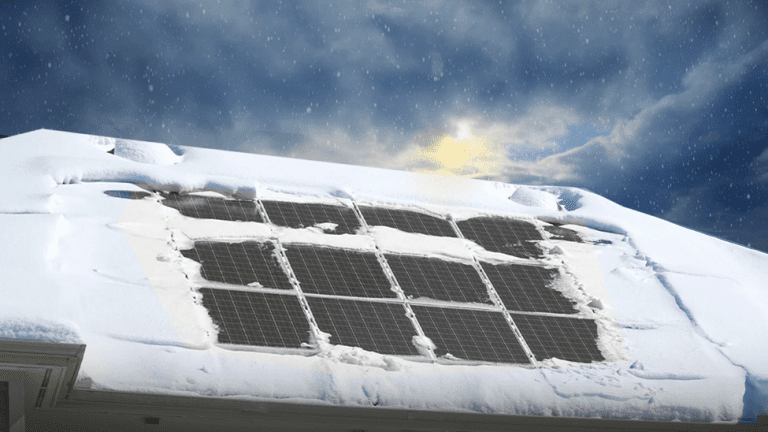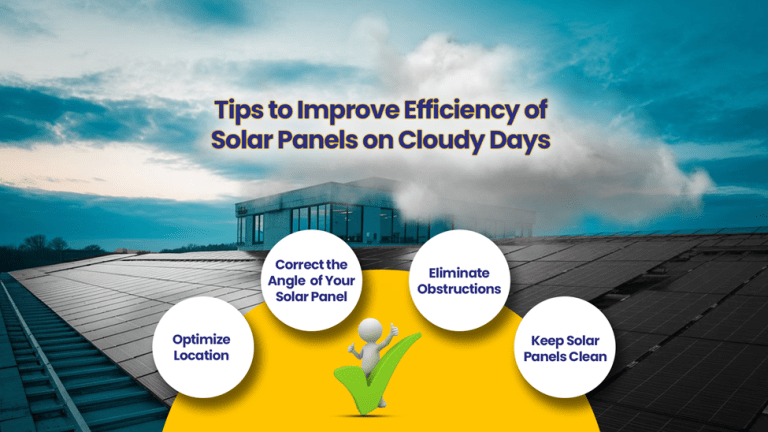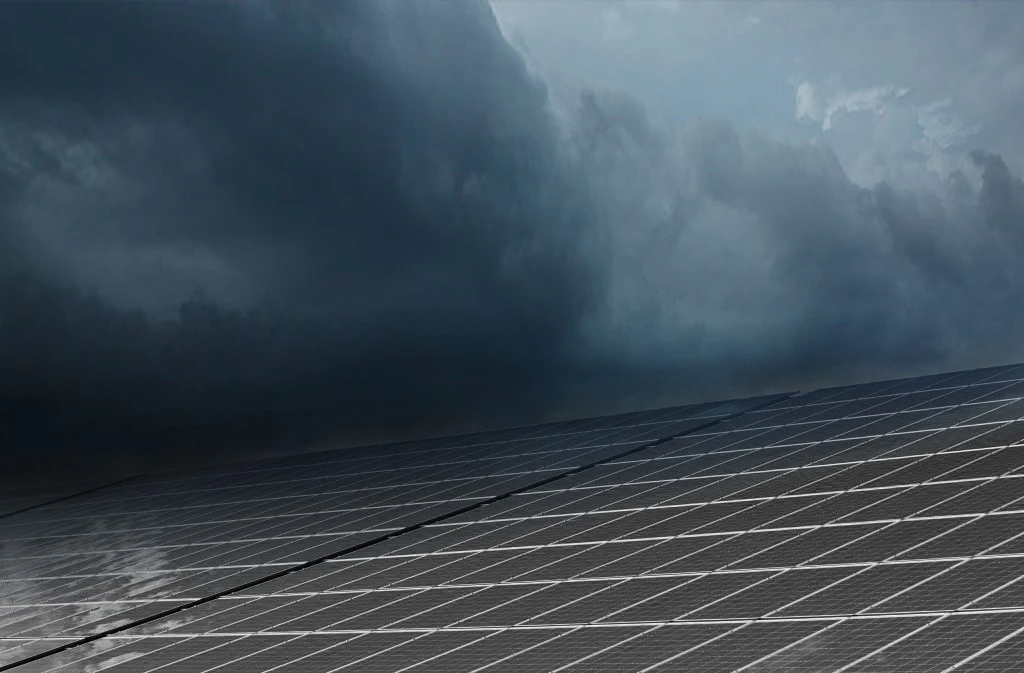- Updated On: October 24, 2024
Do Solar Panels Work on Cloudy
Days and at Night?
If you are considering installing solar panels, you may wonder about “Do solar panels work on cloudy days? It’s actually a valid concern, especially if you’re living in a region where rainy or cloudy days are common.
Well, the good news is that solar panels can still generate electricity even on a cloudy day. While it’s true that solar panels perform most efficiently on bright sunny days, the common misconception that they don’t work at all on cloudy days is false. As long as there is some sunlight, solar panels will continue to produce electricity even on cloudy days. Moreover, modern solar panels are highly efficient and are designed to function year-round, whether it’s raining, cloudy or even snowing. Additionally, backup systems can store energy for use when sunlight is limited.
In this article, we’ll explore how solar panels work on cloudy days or at night and discuss their overall reliability and effectiveness in different weather conditions.

What is “Edge-Of-Cloud Effect”?
The ”edge of cloud effect” is a phenomenon that can actually increase solar energy production during cloudy days. When sunlight passes through the edges of clouds, the sun rays are magnified, resulting in significantly increased energy output.
This temporary spike might seem beneficial, but it can also pose some risks. Because the sudden surge of high voltage can cause your fuses to explode and reduce the lifespan of the inverter. However, with proper system design and protective measures, these risks can be mitigated while ensuring your solar system will remain safe and efficient.
How do solar panels work on cloudy days?
Solar panels generally produce 10-25% of their normal output on cloudy or overcast days, depending on cloud density and weather conditions. For instance, a 4kW (kilowatt) system that typically produces 20kWh (kilo-Watt-Hour) of electricity on sunny days might be able to generate 2kWh to 10kWh on cloudy days.
Likewise, a 100w solar panel can generate up to 100 watts of power under peak sunshine. However, on cloudy or rainy days, it might generate 10 to 50 watts.
This is because solar panels are tested at 1000W/m2 (watts per square meter) of sunlight. This level of solar irradiation is usually only possible on a perfectly sunny day.
Best Temperature For Solar Panels Efficiency
So, do solar panels work in cold weather more effectively? The answer is yes, they do. As opposed to what most people believe, solar panels actually rely on sunlight, not on heat to produce electricity. In fact, cold temperatures can improve their efficiency.
Solar panels use photovoltaic (PV) cells to capture energy from particles, known as photons. When photons hit these PV cells, they activate electrons, to generate electricity that flows into your homes or building’s electrical system. Although, solar panels energy input is usually determined by the amount of sunshine it receives. But the temperature has a direct effect on how efficiently that energy is converted into electricity.
When solar panels heat up, their efficiency drops because the electrons in the panels become overactive. This reduces the difference between their resting state and their activated state, limiting energy production. Cold temperatures, however, keep electrons in a low-energy resting state, and when sunlight strikes, the greater energy difference improves efficiency.
Can solar panels work in rain and snow?
Yes, rain does not stop solar panels from working, but power output is contingent on cloud coverage. However, rain provides a benefit by naturally cleaning the panels, washing away dirt and debris that can block sunlight.
Snow, on the other hand, can reduce solar energy production more than rain. If the panels are covered with snow, sunlight can’t reach the PV cells, power generation stops. But snow tends to melt and slide off the panels, particularly if they are installed at an optimal tilt. Panels are designed to operate in cold temperatures, so once the snow clears, they work as intended.

What are the best solar panels for cloudy days?
All solar panels can generate power on cloudy days, but some are more efficient than others. There are three main types of solar panels: thin film(amorphous), monocrystalline and polycrystalline. However, these technologies differ in how they are manufactured, what kind of silicon is used, or how efficient they are overall. Monocrystalline panels are the most efficient in low-light conditions because they’re made from high-quality silicon with a uniform crystal structure. This allows electrons to move smoothly, maximizing energy production even on overcast days.
Polycrystalline panels, while more affordable, are slightly less efficient in cloudy conditions. They use fragmented silicon crystals, which can limit electron flow. Thin-film panels are the least efficient but are lightweight and flexible, making them ideal for niche applications.
In summary, monocrystalline panels are the best choice for cloudy days due to their high efficiency and superior light sensitivity.
Tips To Improve Solar Panels Efficiency On Cloudy Days
Here are some useful tips to help you get the most out of your solar panels, especially on cloudy days:
Optimize Location:
Install your panels where they’ll receive the most sunlight throughout the day. Consider the sun’s path and any nearby obstructions like trees or buildings that could cast shade.
Adjust Panel Angle:
The angle of your solar panels affects their performance. How tilted your roof is and where you live will determine this angle. In general, the farther you are from the equator, the steeper the angle should be to capture the maximum sunlight.
Eliminate Obstructions:
Trim trees or plants that block sunlight.This is particularly important on cloudy days when every bit of light counts.
Keep Panels Clean:
Regularly clean your panels to remove dust, dirt, and debris that can reduce their efficiency.

Final Thoughts: Don’t Let Clouds Deter You
Still wondering how solar panels work on cloudy days? It’s time to rethink that! Solar panels can generate electricity on cloudy days and perform even better in cooler temperatures. With advancements in solar technology and energy storage, solar systems are more efficient than ever. Solar panels provide long-term value, sustainability, and energy independence.
Contact us today for a free solar estimate and to explore how solar energy can work for you.
Related Articles:
Installing solar panels is a huge investment. For many potential homeowners, the primary motivator to invest in a home solar system is the commitment to long-term savings.
The trend of solar installation is rapidly booming in the U.S. However, a common question of homeowners is “Do Solar Panels Work in Cold Weather?”
Hurricanes are powerful natural disasters that can wreak havoc on buildings and destroy infrastructures causing economic and personal losses.



